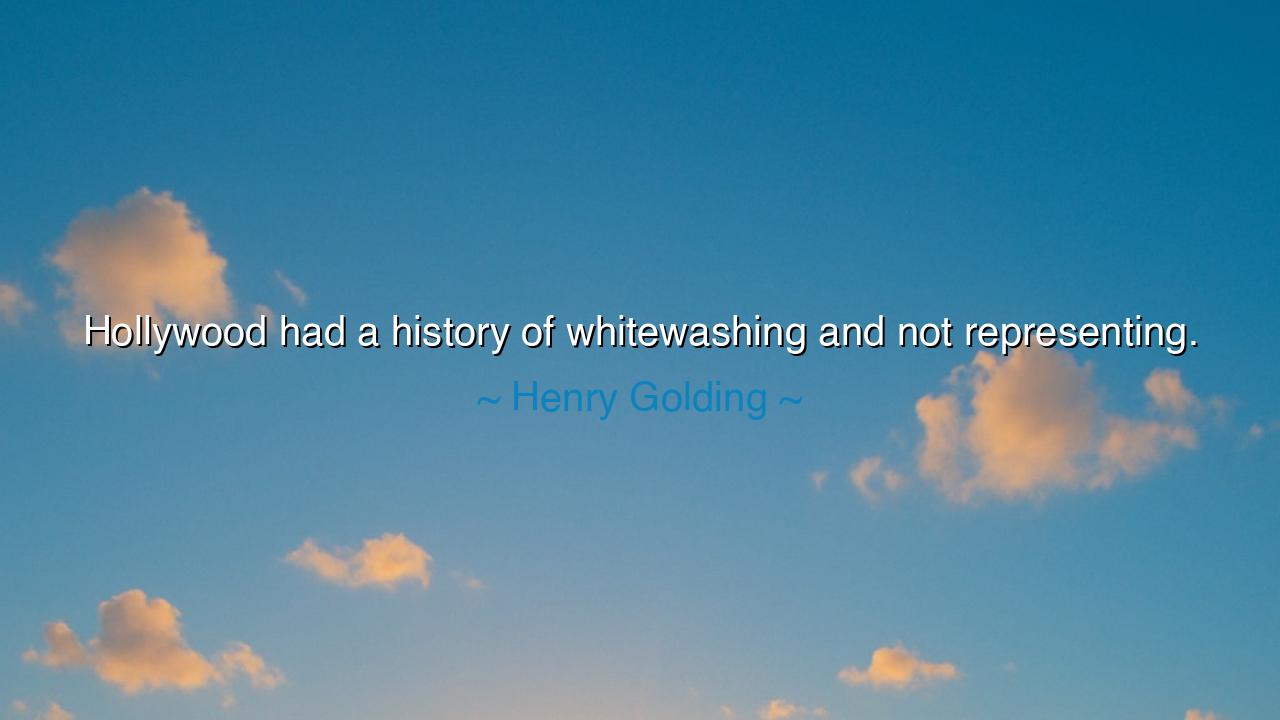
Hollywood had a history of whitewashing and not representing.






“Hollywood had a history of whitewashing and not representing.” Thus spoke Henry Golding, a voice of our own age, yet echoing a truth as old as civilization itself—the struggle for visibility, for truth in portrayal, for the right of every soul to be seen as it truly is. His words are not a cry of bitterness, but a call to remembrance and awakening. For they summon us to reflect on the long centuries in which art, that sacred mirror of humanity, has too often turned its gaze away from the fullness of the human story, showing instead only the reflection of a narrow few.
In the world of Hollywood, the great temple of modern storytelling, dreams are born and broadcast across the earth. Yet, as Golding reminds us, the dream has long been incomplete. Whitewashing—the practice of replacing or erasing people of color from their own stories—stands as a wound in the history of the screen. It is a practice not born of ignorance alone, but of fear—fear of difference, fear of loss of control, fear of seeing beauty in what had been dismissed as “other.” For decades, roles of Asian, African, Native, and Latin descent were given to those who bore no resemblance to the peoples they portrayed. Entire cultures were reduced to caricature, their truth sacrificed upon the altar of profit and prejudice.
The ancients would have called this a form of shadow-making—the act of casting a single light so bright that all else fades into darkness. In the days of empire, the conquerors wrote the stories; the conquered were silenced or reshaped to suit the victor’s image. And so too did Hollywood, inheriting both the glory and the blindness of that tradition, become a storyteller of the powerful rather than the people. To “not represent,” as Golding says, is not a passive act—it is an act of erasure, one that robs entire generations of the ability to see themselves reflected in the shared myth of humanity.
Yet history has always birthed its own counter-voices. Consider Anna May Wong, the first great Chinese American movie star of the early twentieth century. Though her talent burned bright, she was denied leading roles because of her race. In one cruel twist, she was passed over to play the Chinese heroine in The Good Earth, a role instead given to a white actress painted in yellowface. Still, Wong endured, creating beauty even within constraint, her very presence a quiet rebellion against invisibility. She walked through the storm that Golding now names, her life a testament to the truth that art, when stripped of representation, is art without soul.
When Henry Golding rose to prominence through Crazy Rich Asians, it was more than a performance—it was a restoration. For the first time in a generation, millions saw an all-Asian cast on the global stage, speaking their truth, laughing their laughter, living their love stories without apology or disguise. The film became more than entertainment; it became reclamation, a moment when those long unseen stepped into the light and declared, “We exist.” It proved that representation is not merely political—it is deeply human. To see oneself on screen is to be told, you belong in the story of the world.
Golding’s statement, then, is both a reflection and a prophecy. It acknowledges the wounds of the past but gestures toward healing. To name injustice is the first step in undoing it. To speak the truth of exclusion is to open the door to inclusion. Hollywood’s history, once written in shadows, can yet be rewritten in light. But only if those who create choose courage over comfort, honesty over habit, and empathy over ignorance. For in every art, from the ancient amphitheater to the modern screen, representation is the measure of justice.
So let this be the teaching drawn from Golding’s words: do not allow silence to write your story. Wherever there are voices unheard or faces unseen, lift them. Demand truth in your art, fairness in your vision, and humanity in your portrayals. Remember that culture shapes conscience, and every story told falsely leaves a scar upon the soul of a people. The ancients knew that to tell a story was to wield the power of gods—to give shape to the unseen.
Thus, as Golding reminds us, let us wield that power wisely. Let art become once more a vessel of truth, not erasure; of unity, not exclusion. For when every face, every color, every heritage finds its reflection in the world’s great mirror, then—and only then—will storytelling fulfill its highest calling: to reveal humanity in its fullness, radiant and whole.






AAdministratorAdministrator
Welcome, honored guests. Please leave a comment, we will respond soon